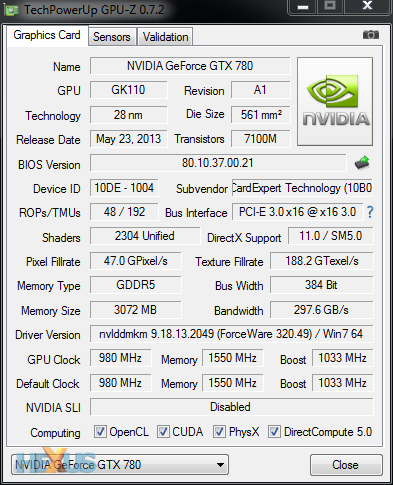Testing methodology
Gainward GTX 780 Phantom GLH 3GB |
|---|
 |
GPU Comparisons |
||||||||
|---|---|---|---|---|---|---|---|---|
| Graphics Card | GPU Clock (MHz) |
Stream Processors |
Shader Clock (MHz) |
Memory Clock (MHz) |
Memory Bus (bits) |
Graphics Driver | Approx Price | |
| Nvidia GeForce GTX Titan 6GB | 837 (876) | 2,688 | 837 (876) | 6,008 | 384 | GeForce 320.18 | £790 | |
| Gainward GeForce GTX 780 Phantom 3GB | 980 (1,033) | 2,304 | 980 (1,033) | 6,200 | 384 | GeForce 320.49 | £570 | |
| ASUS GeForce GTX 780 DirectCU II 3GB | 889 (941) | 2,304 | 889 (941) | 6,008 | 384 | GeForce 320.18 | £600 | |
| EVGA GeForce GTX 780 SC ACX 3GB | 967 (1,020) | 2,304 | 967 (1,020) | 6,008 | 384 | GeForce 320.18 | £540 | |
| Palit GeForce GTX 780 Super JetStream 3GB | 980 (1,033) | 2,304 | 980 (1,033) | 6,200 | 384 | GeForce 320.18 | £515 | |
Gigabyte GeForce GTX 780 WindForce 3X 3GB |
954 (1,006) | 2,304 | 954 (1,006) | 6,008 | 389 | GeForce 320.18 | £515 | |
| Nvidia GeForce GTX 780 3GB | 863 (902) | 2,304 | 863 (902) | 6,008 | 384 | GeForce 320.18 | £500 | |
| Nvidia GeForce GTX 770 2GB | 1,046 (1,085) | 1,536 | 1,046 (1,085) | 7,008 | 256 | GeForce 320.18 | £310 | |
| Nvidia GeForce GTX 760 2GB | 980 (1,033) | 1,152 | 980 (1,033) | 6,008 | 256 | GeForce 320.39 | £200 | |
| Nvidia GeForce GTX 680 2GB | 1,006 (1,058) | 1,536 | 1,006 (1,058) | 6,008 | 256 | GeForce 320.18 | £350 | |
| Nvidia GeForce GTX 670 2GB | 915 (980) | 1,344 | 915 (980) | 6,008 | 256 | GeForce 320.18 | £280 | |
| Nvidia GeForce GTX 660 Ti 2GB | 950 (1,013) | 1,344 | 950 (1,013) | 6,008 | 192 | GeForce 320.18 | £220 | |
| Nvidia GeForce GTX 580 1.5GB | 772 | 512 | 1,544 | 4,008 | 256 | GeForce 320.18 | NA | |
| AMD Radeon HD 7970 GHz 3GB | 1,000 (1,050) | 2,048 | 1,000 (1,050) | 6,000 | 384 | Catalyst 13.5 beta 2 | £320 | |
| AMD Radeon HD 7970 3GB | 925 | 2,048 | 925 | 5,500 | 384 | Catalyst 13.5 beta 2 | £280 | |
| AMD Radeon HD 7950 3GB | 850 | 1,792 | 850 | 5,000 | 384 | Catalyst 13.5 beta 2 | £215 | |
| AMD Radeon HD 7870 2GB | 1,000 | 1,280 | 1,000 | 4,800 | 256 | Catalyst 13.5 beta 2 | £170 | |
| AMD Radeon HD 5870 1GB | 850 | 1,600 | 800 | 4,800 | 256 | Catalyst 13.5 beta 2 | NA | |
HEXUS High-End Test Bench |
||||||||||||
|---|---|---|---|---|---|---|---|---|---|---|---|---|
| Processor | Intel Core i7-3770K (3.50GHz, 8MB cache, quad-core) | |||||||||||
| CPU Cooler | Intel reference E97378-001 | |||||||||||
| Motherboard | Gigabyte GA-Z77X-UP4 TH | |||||||||||
| Memory | 8GB G.Skill RipJaws (2x4GB) DDR3 @ 1,600MHz | |||||||||||
| Power Supply | Corsair AX750W | |||||||||||
| Storage Device | Samsung 830 Series 256GB SSD | |||||||||||
| Optical Drive | Generic 24x DVD-RW | |||||||||||
| Chassis | Corsair Graphite Series 600T | |||||||||||
| Monitor | Dell 3007FPW | |||||||||||
| Operating system | Windows 7 Ultimate (64-bit, SP1) | |||||||||||
Notes
It's worth measuring the in-game frequency across our six games once GPU Boost has been taken into account. The shipping clocks are far less noteworthy than the actual speed the sample runs at.
GTX 780 OC card |
Gainward |
Asus |
Palit |
EVGA |
Gigabyte |
|---|---|---|---|---|---|
Average GPU Boost clock |
1,124MHz |
1,019MHz |
1,124MHz |
1,124MHz |
1,046MHz |
In our test system, the Gainward card boosts, on average, 134MHz higher than the default 980MHz, making it consistent against the Palit and EVGA cards we've tested previously.









